2014人教版八年级英语下册Unit_3_Could_you_please_clean_your_room第一课时教案
八年级人教版下册知识点学习与巩固:Unit3Couldyoupleasecleanyourroom

Unit 3 Could you please clean your room?词1. could you please ⋯你能⋯⋯? /你干⋯⋯.好?2.do the dishes 洗餐具3.sweep the floor 清地板4.take out the trash倒垃圾5.make one ’ s bed床6.fold one’s clothes叠衣服7.clean the living room 清客8.stay out late晚9.his father reason’他父的原因10.get a ride搭e one computer’s使用某人的12.hate sth./to do sth. 某事 /做某事13.do the laundry=do some washing=wash clothes洗衣服14.make breakfast, make dinner, do some cooking 做15.wash the car 刷 16. work on 从事,忙于17.work at 学、致力于、在⋯⋯上下时间make a face做鬼;make a fool of 愚弄,使出洋相make friends with 与⋯⋯交朋友make a name for himself成名make a note of注意,下来make free with 私自使用 makefun of 讥笑make⋯ into 把⋯⋯作成,使成make it 成功,抵达某make one’s living持生活make one ’ s wayto 前去某make room 出地方make up 造make use of利用24. borrow sth. from sb.向某人借某物(借入 )25.lend sb. sth.=lend sth. to sb借.某人某物 (借出 )26.ask for 要求获得、要求到27.take care of = look after 照、照看、照顾take good care of=look after⋯well 28. need some help需要一些帮助第1页/共9页18. borrow some money借一些钱29. come over过来19. invite sb. to do sth 邀请某人做某30. get angry生气事31. have a test考试20. go to the store去商铺32. make a clean sweep of 完全打扫21.agree sb. to do sth同.意某人做某事22.agree with sb. =agree with whatone says赞同某人的建议23.(需认识)make a deal作成交易知识重点1. ---Could you please take out the trash ?你能把垃圾倒掉吗?--- sure . 自然能够。
人教版八年级英语下册 Unit 3《Could you please clean your room》单元测试03及答案
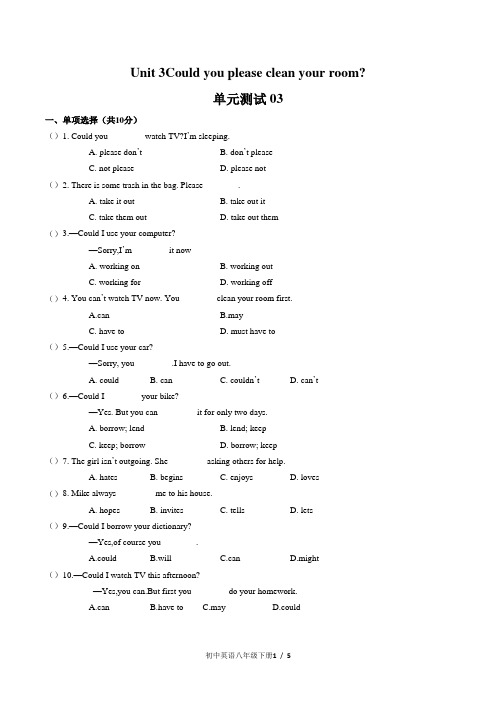
Unit 3Could you please clean your room?单元测试03一、单项选择(共10分)()1. Could you________ watch TV?I’m sleeping.A. please don’tB. don’t pleaseC. not pleaseD. please not()2. There is some trash in the bag. Please________.A. take it outB. take out itC. take them outD. take out them()3.—Could I use your computer?—Sorry,I’m________ it nowA. working onB. working outC. working forD. working off()4. You can’t watch TV now. You________ clean your room first.A.canB.mayC. have toD. must have to()5.—Could I use your car?—Sorry, you ________.I have to go out.A. couldB. canC. couldn’tD. can’t()6.—Could I________ your bike?—Yes. But you can ________ it for only two days.A. borrow; lendB. lend; keepC. keep; borrowD. borrow; keep()7. The girl isn’t outgoing. She ________ asking others for help.A. hatesB. beginsC. enjoysD. loves()8. Mike always ________ me to his house.A. hopesB. invitesC. tellsD. lets()9.—Could I borrow your dictionary?—Yes,of course you________.A.couldB.willC.canD.might()10.—Could I watch TV this afternoon?—Yes,you can.But first you________ do your homework.A.canB.have toC.mayD.could二、完形填空(共20分)Lisa is serious about the chores in her house.She gives her children things that they 11do according to their ages.She started asking John,the 12of her two sons,to help with the dishes.It is now an easy chore 13 the 15-year-old.His 13-year-old brother,Dave,14John,too.They take turns(轮流)washing the 15 each week.The boys also clean their desks,make their beds and 16 food from the market on Sunday mornings.Besides(除了)these,the boys also know how to cook easy meals 17 their parents are not at home.The family of 18 live in a big house but they do all the housework themselves.Lisa says,“When I was young,my father wanted us to do things on our own(独立地)and learn how to19 ourselves.Now I’m doing it to my kids.”John says,“Doing chores is 20.You learn important life skills and responsibility(责任).”()11.A.must B.can C.may D.will()12.A.elder B.taller C.younger D.shorter()13.A.with B.as C.for D.by()14.A.likes B.finds C.hates D.helps()15.A.hands B.dishes C.fruit D.clothes()16.A.borrow B.cook C.buy D.sell()17.A.when B.how C.what D.why()18.A.two B.three C.four D.five()19.A.work on B.take part inC.turn onD.take care of()20.A.bad B.good C.difficult D.boring三、阅读理解(共15分)I have a big family.We often get together at our home every Sunday.When I was 5 years old,my grandparents,parents,aunt,uncle and my cousin,Jane,would have a wonderful time playing games,swimming,relaxing and sharing stories.On one sunny summer Sunday,Jane thought it would be funny to push me into the swimming pool we had in the garden.I couldn’t believe Jane had done this to me,so I decided to put a big pout(噘嘴)on my lips until I found some sympathy.Wet and unhappy,I sat next to my grandpa on a nearby picnic bench.When he asked me what was wrong,I told him what Jane had done.“Well,just push her back!” he said.After hearing my grandpa’s suggestion,I watched Jane’s every move until she was in just the rightplace near the pool.Then I pushed her into the pool.She was good at swimming and didn’t get hurt.Soon after that year,Grandpa moved from Ohio to Florida,so I didn’t see him before he died when I was 11 years old.I will never forget the lesson my grandpa taught me during the short time we had together.When someone or something is pushing you in a wrong way,push back!()21.According to the passage,the writer’s cousin ________ him.A.played a joke onB.tried to helpC.was smarter thanD.was afraid of()22.What does the underlined word “sympathy” mean in Chinese?A.不满B.生气C.同情D.骄傲()23.Which of the following is NOT true according to the passage?A.Jane was good at swimming.B.The writer told us what happened in summer.C.No one cared about the writer when he was pushed into the pool.D.There were eight people in the writer’s family when he was five.()24.How long did the writer’s grandpa live in Florida?A.For 5 years.B.For 4 years.C.For 11years.D.For 16 years.()25.What will the writer do when someone pushes him in a wrong way?A.Keep quiet.B.Stand up.C.Run away.D.Push back.四、用所给词的适当形式填空(共15分)26.Everyone should learn the ability of________(independent).27.Most people will feel________(comfortable)if someone sneezes or coughs loudly at dinner table.28.The whole world is surprised at China’s fast________(develop), although China is a________(develop)country.China is becoming stronger and stronger.29.Tomorrow must be a busy day.I________(invite)all my friends to my house.30.—Dave,where is your father?—He is watching TV in the________(live)room.五、根据汉语意思完成句子(共20分)31.孩子们仅仅在学校里取得好成绩是不够的。
人教版八年级英语下册 Unit 3 Could you please clean your room

Unit 3 Could you please clean your room? 单元测试姓名:__________ 班级:__________ 学号:__________一、单选题(共15题;共15分)1.Henry will g ive us a report as soon as he _________.A. arrivesB. arrivedC. is arrivingD. will arrive2. It is necessary for us students the listening ability.A. to improveB. improvingC. improveD. improves3.—________ I try on those shoes in the window?—________. They are just on show.A. Could; Yes, you canB. Can; Sorry, you couldn'tC. Could; Sorry, you can'tD. Can; Yes, you could4.There is wrong with Tom's leg. We should send him to hospital at once.A. somethingB. anythingC. everythingD. nothing5.My father often listens to the radio he is driving.A. untilB. becauseC. whileD. where6.— Jim, could you please make _______ bed?— Yes, mom. I'll do it right now.A. youB. yourC. yoursD. yourself7.I could ________ my bed and ________ my clothes.A. make; foldB. make; doC. fold; doD. fold; wash8. we are not able to answer this question,maybe we should ask someone else.A. SinceB. AlthoughC. BeforeD. Unless9.I will finish the novel this afternoon. Then I'll give it back to you.A. readB. readingC. to readD. reads10.We shouldn't always _____ our parents. We should learn to be independent.A. take afterB. care aboutC. hear ofD. depend on11.- I hurt myself at home yesterday.- ___________________________________A. I'm sorry to hear that.B. Is that so?C. Sounds like fun.D. That's all right.12.Cindy likes reading and she spends much money books.A. inB. onC. withD. from13.The talent show is the game show. I like both.A. as boring asB. not so bored asC. as interesting asD. not so interested as14.I don't like doing the dishes because it's ____________ .A. interestingB. boringC. interestedD. bored15.—Could I go to see the BFG with Ann tonight , Mom?—.But don't stay too late.A. It's a good ideaB. Thanks a lotC. Sure, that's OKD. You're right二、根据短文理解,从A、B、C、D四个选项中选择最佳答案填空。
八年级英语下册-Unit-3-Could-you-please-clean-your-room-Se
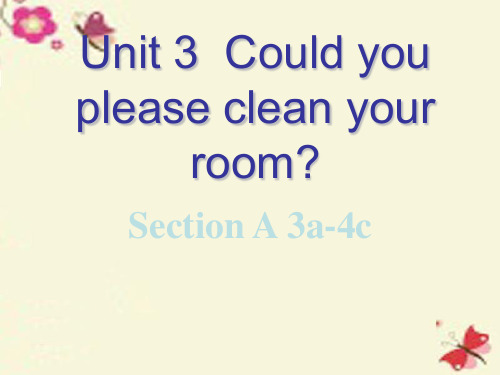
3b
Read the sentences below. Underline the sentences from the reading that mean the same thing.
1. Neither of us did any housework for a week. For one week, she did not do any housework and neither did I. 2. My mom came over as soon as I sat down in front of the TV. The minute I sat down in front of the TV, my mom came over. 3. You're tired, but I'm tired, too. Well, I work all day at school, too! I'm just as tired as you are!
not to get it wet.
1—d 2—a 3—c 4—e 5—b
4b Fill in the blanks in the conversation.
A: I hate to __d__o__ chores.
B: Well, I hate some chores too, but I like other chores.
2. Could I watch one show first? (noun) ___C_o_u_l_d_y_o_u__p_l_ea_s_e__sh_o_w__m__e_y_o_u__r_n_e_w__b_o_o_k_?__(v_e_r_b_)___ 3. I can't work all day. (verb) __I_t_’s__d_if_f_ic_u_l_t_t_o_f_in__d_w__o_rk__i_n_t_h_i_s_c_it_y_._(_n_o_u_n_)________ 4. You watch TV all the time. (verb) __H__o_w__m__u_c_h_i_s_t_h_a_t_w_a_t_c_h_?__(n_o_u__n_) _________________ 5. “What happened?” she asked in surprise. (noun) __I_t_w__o_n_'t__su__rp__ri_s_e_m__e_i_f_h_e_l_o_s_e_s_t_h_e_e_x_a_m__. _(v_e_r_b_)_____
人教版八年级英语下册Unit3Couldyoupleasecleanyourroom全单元教案
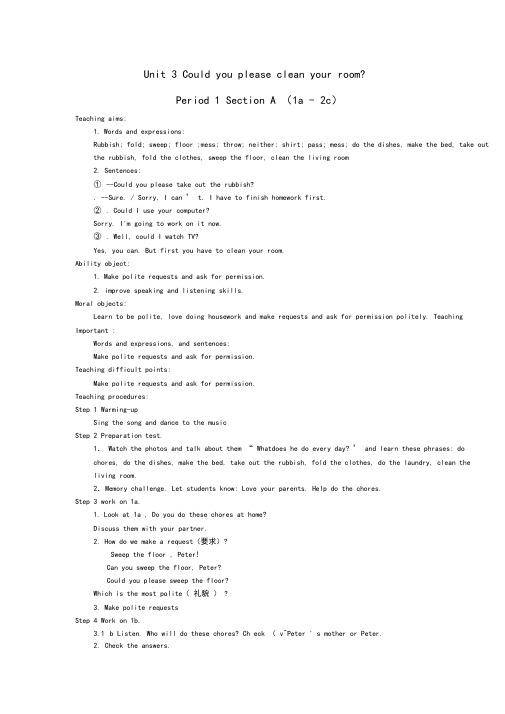
Unit 3 Could you please clean your room?Period 1 Section A (1a - 2c)Teaching aims:1.Words and expressions:Rubbish; fold; sweep; floor ;mess; throw; neither; shirt; pass; mess; do the dishes, make the bed, take out the rubbish, fold the clothes, sweep the floor, clean the living room2.Sentences:①--Could you please take out the rubbish?. --Sure. / Sorry, I can ’ t. I have to finish homework first.②. Could I use your computer?Sorry. I'm going to work on it now.③. Well, could I watch TV?Yes, you can. But first you have to clean your room.Ability object:1.Make polite requests and ask for permission.2.improve speaking and listening skills.Moral objects:Learn to be polite, love doing housework and make requests and ask for permission politely. Teaching Important :Words and expressions, and sentences:Make polite requests and ask for permission.Teaching difficult points:Make polite requests and ask for permission.Teaching procedures:Step 1 Warming-upSing the song and dance to the musicStep 2 Preparation test.1.Watch the photos and talk about them “ Whatdoes he do every day? ’ and learn these phrases: dochores, do the dishes, make the bed, take out the rubbish, fold the clothes, do the laundry, clean the living room.2.M emory challenge. Let students know: Love your parents. Help do the chores.Step 3 work on 1a.1.Look at 1a , Do you do these chores at home?Discuss them with your partner.2.How do we make a request(要求)?Sweep the floor , Peter!Can you sweep the floor, Peter?Could you please sweep the floor?Which is the most polite(礼貌) ?3.Make polite requestsStep 4 Work on 1b.3.1 b Listen. Who will do these chores? Ch eck ( v^Peter ' s mother or Peter.2. Check the answers.Step 5 Group work .Group work: Family drama( 家庭短剧)1.Each group is a family.2.We need to clean the house.3.To make a similar conversation of listening material.Example:Mom : We need to clean the house. We are going to have a party.Dad : Could you please sweep the floor?Peter: No problem.Grandpa: Well, could you please do them? I ’ m going to clean the living room.Step 6 Listening 2a&2b1.Peter asks his father if he can do four thing s. What does his father say? Check ( V) yes ” or“ no” . Listen again. Draw lines to the reasons.2.Check the answers .Step 6 Pair work.Make conversations using the information in 2a and 2bA:Could I use your computer?B:Sorry. I ’ m going to work on it now.A: Well, could I watch TV?C:Yes, you can. But first you have to clean your room?Period 2 Section A (2d , grammar )Teaching aims:1.Words :Mess; borrow, invite, disagree, snack, teenager2.Sentences:Yes, because Mom will be back from shopping any minute now. And she won she sees this mess.t be happy if But the house is already pretty clean and tidy!Could you buy some drinks and snacks?Could I invite my friends to a party?Could I go out for dinner with my friends?OK/ Sure, that should be OK.No, you can ’ t. You have a basketball game tomorrow.Ability object:1.Make polite requests and ask for permission.2.improve speaking and reading skills.3.Master the structures of could .Moral objects:Learn to be polite, love doing housework and make requests and ask for permission politely.Teaching Important :Words and expressions, and sentences:Make polite requests and ask for permission.Teaching difficult points:Make polite requests and ask for permission.Teaching procedures:Step 1 Warming-up .1.Watch a video and answer:Who is the girl in the movie?Is the house clean or dirty?What did she do?2.Do some exercises.Step 2 Work on 2d.1.2d Read the conversation and answer:What chores will Tony have to do?2.2d Role - play the conversation.Step 3 Presentation.1.Read ,think the knowledge.2.Give some explainationsStep 4 Work on 4a.1.Write R for requests and P for permissions. Then match each one with the correct response.2.Check the answers.Step 5 Work on 4b.1.4b Fill in the blanks in the conversation.2.check the answers.Step 6 Work on 4c.4c Make a list of things your group needs to do for a camping trip. Then discuss who will do bring a tent them and complete the chart.Example:A:Could you please bring Liu Chang?B:Sure. And could you please •••?C:Sorry, I can ' t. I have to …Step 7 Homework.Period 3 Section A (3a-3c )Teaching aims:1.Words and expressions:throw, neither, shirt, all the time, as soon as.2.Sentences:①. He wanted a walk, but I was too tired. I threw down my bag and I went to the living room.②. “ No! ” she replied angrily. h TV“ayllothuewtaimtce and never help out around thehouse!I can ’ t work all day and do housework all evening. ”③. “ well, I work all day at school, too! I ’ m just as tired as yaocuka. re! ” I shouted b Ability object:1.Make polite requests and ask for permission.2.improve speaking and reading skills.Moral objects:Learn to be polite, love doing housework and make requests and ask for permission politely.Teaching Important :Words and expressions, and sentences:Make polite requests and ask for permission.Teaching difficult points:Make polite requests and ask for permission.Teaching procedures:Step 1 Warming-upStep 1 Lead in.1.T: We have leaned the phrases about chores. Look at the picture, what are they doing?Do you often do chores at home ?Show the title.Step 2 2b Reading.2.Look at the picture and answer :Does Nancy often do any housework?3.Read the passage carefully and answer.How does Nancy ’ s and her mother’ s feelings change?4.Read the sentences.5.Read the passage and answer the following questions.①Why was Nancy ' s mom angry with Nancy?② Did they solve the problem? How?③ Can you infer what Nancy ’ s mother will feel ?6.What do you learn from the message?We need to share the housework to have a clean and comfortable home .Can you infer what Nancy will do at home?Step 3 Work on 3b.Read the story again and read the sentences below. Underline the sentences from the readingthat mean the same thing.1.Neither of us did any housework for a week.2.My mom came over as soon as I sat down in front of the TV.3.You ’ re tired, but I ’ m tired, too.Step 4 Work on 3c.. Decide whether the underlined words in the sentences are verbs or nouns. Then write another sentence using the underlined word in the other form.1.Could you take the dog for a walk? (noun)2.Could I watch one show first?3.I can ’ t work all day.4.You watch TV all the time.5.“ What happened? ” she asked in surprise.Step 5 Homework.Period 4 Section B (1a-1e )Teaching aims:New words: snack teenager borrow invitePhrases: buy some drinks and snacks; borrow some money; invite sb. to a party/to do sth. Sentences :--Could you please clean your room?--Yes, sure. / Sorry, I can ' t. I have to do my homework.-- Could I invite my friends to aparty?--Of course/ Yes, you can /No, you can Ability object: t. You have to1.Make polite requests and ask for permission.2.improve speaking and listening skills.Moral objects:Learn to be polite, make requests and ask for permission politely; and love parents. Teaching Important :Words and expressions, and sentences:Make polite requests and ask for permission.Teaching difficult points:Make polite requests and ask for permission.Teaching procedures:Step 1 lead-in.1. Show the title.2. DiscussionQ: Do you help your parents do the chores at home?Q: Do your parents ask you to do a lot of things forthem?What do your parents ask you to do?What do you ask your parents Step 2 Work on 1a.1.What do teenagers ask their parents 'permission for?' permission for? What do parents ask their teenagers todo? Write parents or teenagers next to each phrase.2. Check the answers.Step 3 Finish 1b.Use the phrases in 1a to makeconversations.Example :Parents : Could you clean your room ?Child : Yes, I can.Child : Could I invite my friend to aparty ?Parents : No, you can't .Useful language:1.Parents: Could you please …?Child: Yes, sure. / Sorry, I can ' 2.Child: Could I •••? t. I have to ...Parents: Yes, you can. / No, you can t.You ...Step 4 Finish 1c and 1d.1.Listen to a conversation between Sandy and her mom. Check ( V ) Oh wdhings in 1a thhear.2.Listen again. Fill in the chart.Step 5 Finish 1e.You are having a party. Invite your partner to come your party and ask for help withthese things. So, talk about the following things with your partner.e.g. A: Would like to come to my birthday party?B: Yes, I ' d love to./Sorry, I can ' t. I have to …A:Could you please take out the rubbish?B:Yes, sure./No, I can ' t. I have to do …Step 6 Homework.Period 5 Section B (2a-2e)Teaching aims:1.Learn and review some important phrases and target languages.2.Review how to make polite requests how to ask permissions politely3.Read the letters carefully and surf the Internet, try to find out more reasons to supportyour idea, and then write a letter to th e person that you don ’ t agree with.Ability object:1.Learn how to debate and show your own opinions.2.Practice speaking, reading and writing skills.3.Interview your friends, your teachers or your parents about their opinions about kids doingchores and take notes.Moral objects:Discuss with your partners and show your own opinions.Teaching Important :Learn and review some important phrases and target languages.Teaching difficult points:1.Interview your friends, your teachers or your parents about their opinions about kids doingchores and take notes.2.Read the letters carefully and surf the Internet, try to find out more reasons to supportyour idea, and then write a letter to the person that you don ’ t agree with.Teaching procedures:Step 1 Warming-up1.Review.Step 2. 2a. pre-reading.2.Discuss the questions with your partner① What do you often do to help your parents at home?② Do you think kids should help out with chores at home?3.New words learning.Step 3. While reading1.What ’s “ Skimming “2.2b. The Sunday Mail magazine invited parents to write about whether they think young peopleshould do chores at home. Skim the following letters. Which one agrees and which onedisagrees?3.Reading.①. Read the examples, and guess the meanings of “ pro” and “ con” .②2c. According to Mr. Smith and Ms. Miller, what are the pros and cons about kids doingchoresStep 4 Post reading.1.Be a good debater. Let ’s have a debate.2.2d. Write one sentence with each phrase from the letters.3.2e Discuss the questions with a partner.Step 5 Homework.Period 6 Section B (3a-self check )Teaching aims:1. WordsFair; unfairnguage:help with housework and chores at home have enough stress from schoolspend the time on school work in order toThere is no need for them to …It is important for sb. to do sth.It ' s not enough to … develop children ' s independence The more •••, the more …Ability object:1.Learn how to show your own opinions.2.Practice speaking, and writing skills.Moral objects:Discuss with your partners and show your own opinions. Teaching Important :1.Learn how to show your own opinions.2.Practice speaking, and writing skills.Teaching difficult points:1.Learn how to show your own opinions.2.Practice speaking, and writing skills.Teaching procedures:Step 1 Warming-upSection B 2 (3a —Self check)Step 1 RevisionDiscuss the questions with a partner. And take notes.Do you think children should do some chores at home? Why or why not?1.信头:发信人地址和日期。
人教版英语八年级下册 Unit3 Could you please clean your room教
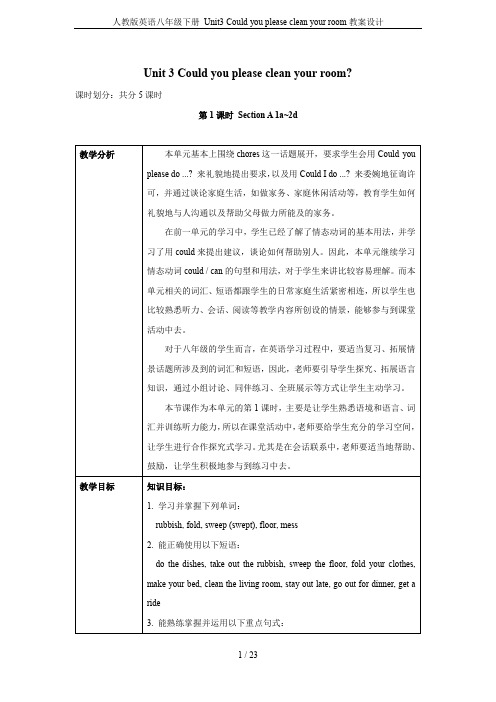
A: Could you please sweep the floor?
B: Yes, sure. Can you do the dishes?
A: Well, could you please do them? I’m going to clean the living room.
Peter
do the dishes
M
sweep the floor
M
take out the trash
P
make the bed
P
fold the clothes
P
clean the
living room
M
2. Make conversations about the chores in 1a.
7) Could you take out the rubbish, fold the clothes and do the dishes?
8) Could I at least finish watching this show?
能力目标:
通过听说训练,学会能够礼貌地提出要求或征询许可,并礼貌地回复别人的请求与征求。
Peter wantsto...
Peter’s fathersays
go out fordinner
√yes _____no
go to themovies
√yes _____no
stay outlate
_____ yes√no
get aride
_____ yes√no
Check answers.
2014人教版新目标英语八年级下Unit3_Could_you_please_clean_your_room_sectionA_1a-2d

√ √ √ √ √ √
What
How often
sometimes once a week
three times a week
every day every day twice a week
Make a report like this:
Hello, I'm ..... In my group, We think Kate is the most hardworking. Kate usually does the dishes. She sweeps the floor once a week. She…
Could you please …? …
Yes, sure. Can you …? …
Stay up late
A: Could I stay out until twelve? B: No, you can’t./ No, please don’t.
go out for dinner
A: Could I go out for dinner with my friends? B: Of course./It’s OK.
A: Could I use your …? B: Sorry. I'm going to … . A: Well, could I …? B: Yes, you can. But … / No, you can't…
Listen to the conversation and answer the questions
What’s the boy’s name? Who’s the man in the picture? How do you know? Where are they when they’re talking? Why do you say so? What does Peter want to do?
八年级下册人教版英语Unit3_Could_you_please_clean_your_room课件
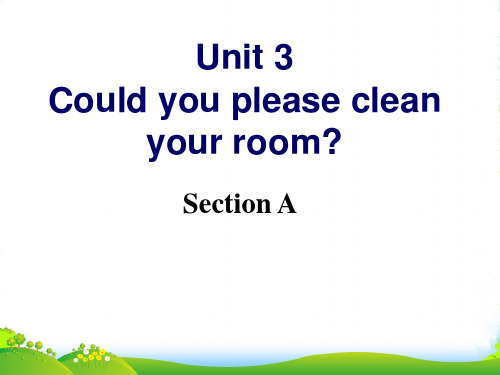
2. have to有人称、数、时态的变化, 而must只有一种形式。但must 可 用于间接引语中表示过去的必要 或义务。
He had to look after his sister yesterday.
3. 在否定结构中: don’t have to 表示 “不必”, mustn’t 表示“禁止”。 You don’t have to tell him about it. 你不一定要把此事
√
room
1c Pairwork
A: Could you please sweep the floor? B: Yes, sure. / I’m sorry, but I’m
reading the newspaper.
2a Listening and check “yes” or “no”.
have to和must
1. 两词都是 “必须”的意思, have to 表示客观的需要, must 表示 说话人主观上的看法, 既主观 上的必要。
My brother was very ill, so I had to call the doctor in the middle of the night. 我弟弟病得很厉害,我只得半夜里 把医生请来。(客观上需要做这件事) He said that they must work hard. 他说他们必须努力工作。 (主观上要做这件事)
cooking. I _c_a_n_ come later. 2. - _M__u_st_ we clean the windows today?
- No, you _n_e_e_d_n_’_t. You __c_a_nclean them tomorrow.
3. - _M__a_y I watch TV this evening, mum? - No, you _m_u__st_n_’_t. Work _m__u_s_t come first.
- 1、下载文档前请自行甄别文档内容的完整性,平台不提供额外的编辑、内容补充、找答案等附加服务。
- 2、"仅部分预览"的文档,不可在线预览部分如存在完整性等问题,可反馈申请退款(可完整预览的文档不适用该条件!)。
- 3、如文档侵犯您的权益,请联系客服反馈,我们会尽快为您处理(人工客服工作时间:9:00-18:30)。
2、扔垃圾_________ 8、出去吃放________
3、叠衣服_________ 9、去看电影________
4、扫地_________ 10搭便车________
5、整理床_________ 11从事、忙于________
6、打扫起居室_______
调动学生学习的自主性,培养学生的动手能力.在操作中,增强学生的责任感,懂得自己应尽的义务.
I hope you can learn it carefully and help your parents at home,Ok?
通过师生之间的自由对话导入新课。
Step2学习目标
1、词汇及短语:do chores,do the dishes,sweep,sweep the floor,take out,trash,fold,make the bed,living room,stay out late,get a ride,work on
教学内容
Unit 3Could you please clean your room?
Section A (1a-2d)
课时
Period1
教学对象
八年级学生
课型
新授课
授课教师
任巍
学校
十堰市竹山县楼台乡沧浪九年制学校
一、教材分析
Section A以图片及对话Peter, could you please take out the trash? Sure, Mom.引入本单元的话题。1a是一个结对子活动,通过讨论在家做哪些家务活来引入本单元的重点词汇;1b让学生听一段对话录音,;1c是一个口头会话练习,指导学生如何结合图片用目标语言Could you please ...?进行对话;2a和2b是两个听力活动,通过听力训练提出请求、征求许可;2c是在以上听力活动的基础上的口头练习,练习用目标语言委婉的提出请求。
5.finish doing sth只接动名词做宾语的动词
6.enough的用法修饰形容词、副词原级的词
二、,Act out the conversation 2d每组展示一次
根据表演的语音、语调、动作表情及其参与的组员加分
总结本节课的教学重点。
Step7
Homework
1)Copy the phrases and sentences in1a.
2. –_______ I try on those shoes in the window?
–_______They are just on show.
A. Could ;Y es,you canB. Can;Sorry,you couldn’t C.Could; Sorry you can’t D.Can;Yes,you could
Step6小组评价与反馈总结
一、,Explain the most important points.每组推选一名组员讲解知识点
1.Could you please clean your room?的肯定与否定回答
2help的用法
3.at least、any minute now的用法
4.if引导的条件状语从句
二、教学目标(知识,能力,情感态度、价值观)
1、知识与技能:
(1)重点单词和词组。
(2)使用could做出礼貌要求和请求许可。
2、过程与方法:通过合作探究的方式解决本节课的重点知识点。
3、情感态度与价值观:学会照顾自己,培养自己的独立意识。
三、教学重点
情态动词could的用法
四、教学难点
Could you please clean your room?的肯定和否定回答
2)Make five conversations with Could you please do …and give different responses.
巩固所学知识,培养综合运用语言的能力.
3.请别在这吸烟好吗?
Could_______ _______ ________ ______
4.尽管他穷,但至少他是诚实的。
Although he is poor,_______ _______he is honest.
课堂做题真实反映学生掌握知识的情况,教师可以发现存在的问题,教师当堂指导,有利于因材施教。
B: Yes, sure. Can you do the dishes?.
A: Well, could you please do them? I’m going to clean the living room
B: No problem..
42alisten . Peter asks his father if he can do four things. What does his father say?Check(√)yes or no.
五、学情分析
本课话题来自学生的生活经历,学生在初一已经学习了许多动词短语,为表达提供了语言基础,此外,学生已初步掌握了使用祈使句和Could you…?提出请求和建议及回答.为本课的学习打下了铺垫。
六、教学过程
教学任务
教师活动
设计意图及资源准备
Step1课堂导入
T: Do you often help your parents at home ?
S1: Yes.
T: What do you usually do to help your parents ?
S1:I often wash the clothes……
做两三组口头练习,然后继续师生问答
T: What do you do to help ?
S: I…………
T: Do you often do some housework at home ? Today we are going to learn to do chores .(板书do chores并解释)
Sபைடு நூலகம்ep4小组合作
1、牢记la—2d出现的词组,与同伴讨论
2、1b根据听力材料,打√小组展示。
listen Who will do these chores? Check(√)Peter’s mother or Peter.
3、1c小组讨论,编对话并展示。
A:Could you please sweep the floor?
合作体验,交流讨论:设置合作活动,使学生能熟练运用目标语言完成任务,培养合作意识,让他们用目标语言交流讨论。
Step5达标测评
1. –Could I use your eraser for a while?
–Yes, of course you_______.
A. could B. can C. will D.should
3、交际功能,客气、委婉地提出请求及其回答(允许、拒绝)。
利用flash cards引入新短语,激发学生学习的好奇心,从而调动学生学习英语的主动性和积极性.明确学习目标.
Step3自主学习
研读课本,自主预习
从课本1a-2d中找出下列短语。
1、.洗盘子_________ 7、请打扫你的房间________
